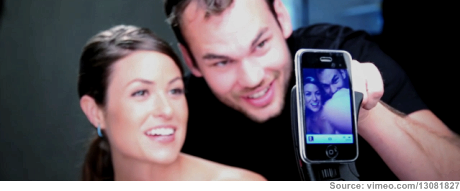Who needs a DSLR when you can have an iPhone?

The one thing you will see on a night out in a student bar, or any club throughout a city center is the flash, click and red dots of digital cameras. Everybody takes photos, whether it's from their phone, digital camera or to the select few with invested interest or a professional understanding, a DSLR and accompanying lenses.
This 10 minute video from FStoppers (via @awv) proves that any camera can be used to take high resolution, good quality images and that, anybody can in fact be a photographer.
Lee Morris, the photographer in the video, posted last week the results of his 'experiment':
"I posted a few of the images and asked people to critique them (never exposing that they were shot on my cell phone). I couldn’t help but laugh when a few of our readers claimed that these were “the best images I had ever taken.” Nobody ever claimed that they were too grainy, too soft, or lacked detail."
(See 3min 40secs for a funny moment where the iPhone being used to take the photos gets an incoming call).
For the sakes of this video, the iPhone is used. But frankly, if you take any mobile device that has been released in this and last year, you'll find the camera quality to be quite good. I find the 3.2mp camera on my BlackBerry Curve 8900 to take high-resolution, sharp pictures which are of more than acceptable quality.
Multimedia design and photography courses are ever popular with today's student. With elements of art and technology mixed together, it boils down to perception and portraying what others see, these modern courses are designed with digital camera uses at mind. As something we of the Generation Y have been brought up on as an ever-developing and evolving technology.
The message from this is simple. Though it helps having professional models and lighting rigs, along with the rest of the equipment ranging from tripods and make-up and hair designers, you don't need a fully fledged DSLR to take good photos.
But for the more advanced photographer, in not only results but perception of professionalism, a compact flash camera or a camera phone will not last you long in industry.

Speaking to good friend and photographer Madeleine Duggan, just graduating with a first degree (3.7 GPA) in film studies at the University of Kent, she pointed out that though you don't need the full spec equipment, it most certainly helps.
"An iPhone camera for example is massively different to an normal SLR or a DSLR, as you need expertise in aperture, shutter speed, perspective and the knowledge behind the vast number of settings on the camera. It's not just a point and click. The compact flash does well enough for most in social settings. But there is a necessary skill with the subjects in the photo and the composition of the frame".
With the rise of marketed camera phones - mobile devices used as phones but with full camera ability, similar to that of a compact flash camera, the choice of device does make a difference.
"One of the most important element of photography is the lighting. The flash on a DSLR or external flashes and strobes are a lot better than compact cameras or camera phones. Megapixels to a point make a difference. Unless you are working on material which can be blown up or edited in great detail on PhotoShop, megapixels are not as important as the lens. The lens on the device does make the difference, which is why DSLR's produce far greater picture quality".
The lesson here is that phone cameras are perfect for anything other than studio work, and that the perception in a working environment makes a difference. You wouldn't expect a professional photographer to pitch up with their iPhone or compact flash camera, otherwise you'll look naff.
But for the vast majority, a compact flash will do. For those who want to try their skills without paying through the teeth for an expensive DSLR, a camera phone with the balance of a good lens (many Nokia phones have good quality Carl Zeiss lenses installed by standard) and decent megapixels should suffice.